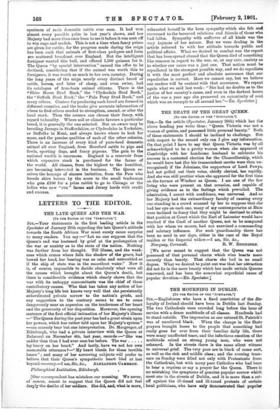LETTERS TO THE EDITOR.
THE LATE QUEEN AND THE WAR.
[TO THE EDITOR OF THE "SPECTATOR."] Sin,—Your statements in the first leading article in the Spectator of January 26th regarding the late Queen's attitude towards the South African War must surely cause surprise to many readers. You say :—" Let no one suppose that the Queen's end was hastened by grief at the prolongation of the war or anxiety as to the state of the nation. Nothing was further from her thought. Till illness, and the weak- ness which comes where falls the shadow of the grave, had bowed her head, her bearing was as calm and untroubled as if the ship of state was in the smoothest water." Now it is, of course, impossible to decide absolutely what were all the causes which brought about the Queen's death, but there is considerable evidence which clearly shows that the war with its unhappy concomitants was the chief of these contributory causes. Who that has taken any notice of her Majesty's long life but knows very well that she persistently subordinated private sorrow to the nation's griefs, and any suggestion to the contrary seems to me to come dangerously near an aspersion on the tenderness of her heart and the generosity of her disposition. Moreover, the opening sentence of the first official intimation of her Majesty's illness —" The Queen during the past year has had a great strain upon her powers, which has rather told upon her Majesty's system" —can scarcely bear but one interpretation. Dr. Macgregor, of Edinburgh, who had a private interview with the Queen at Balmoral on November 4th, last year, records :—" She was
sadder then than I had ever seen her before. The war lay heavy on her heart." And lastly, have we not her own memorable utterance P—" My heart bleeds for these terrible losses " ; and many of her sorrowing subjects will prefer to believe that their Queen's sympathetic heart bled at last beyond recovery.—I am, Sir, &c., ALEXANDER CAMERON.
Philosophical Institution, Edinburgh. • [Our correspondent has mistaken our meaning. We never, of course, meant to suggest that the Queen did not feel deeply the deaths of her soldiers. She did, and, what is more,
exhausted herself in the keen sympathy which she felt and expressed to the bereaved relations and friends of those who had fallen. Sympathy with sufferers of all kinds was the very keynote of her nature. But we were dealing in the article referred to with her attitude towards public and political affairs. What we desired to combat was the report that has been spread abroad that the Queen died of something like remorse in regard to the war, or, at any rate, anxiety as to whether our cause was a just one. That notion must be repudiated in the strongest possible way, and we do repudiate it with the most perfect and absolute assurance that our repudiation is correct. More we cannot say, but we believe our readers will be content with that assurance. We repeat again what we said last week : " She had no doubts as to the justice of her country's cause, and even in the darkest hours of the war a year ago she preserved an equanimity of soul which was an example to all around her."—En. Spectator.]


































 Previous page
Previous page